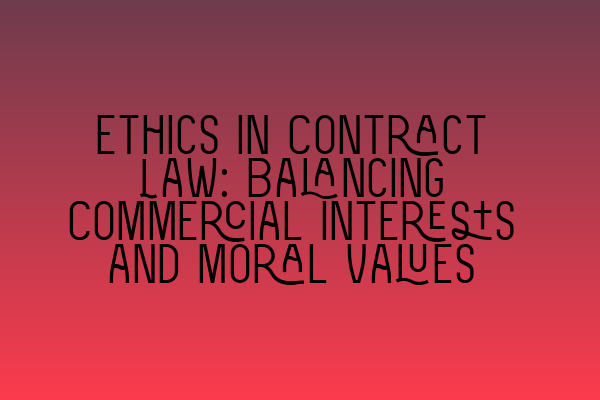Ethics in Contract Law: Balancing Commercial Interests and Moral Values
Contract law serves as the foundation for business transactions, governing the legal relationships between parties. It provides a framework for enforceable agreements and ensures that parties honor their obligations. However, as contract law operates within the realm of commerce, it often encounters ethical dilemmas where commercial interests clash with moral values.
In this article, we will explore the delicate balance between commercial interests and moral values in contract law. We will delve into the ethical considerations that contract law practitioners must navigate and the implications of these considerations in the business world.
The Role of Contract Law
Contract law is designed to promote fairness, predictability, and efficiency in business transactions. It provides a set of rules and principles that govern the formation, interpretation, and enforcement of contracts. Contracts, in turn, facilitate robust commercial relationships by clearly defining the rights and obligations of the parties involved.
However, the broad scope of contract law also means that it occasionally intersects with ethical dilemmas. What happens when enforcing a contract undermines moral principles? How do we strike a balance between commercial interests and ethical considerations?
Ethical Dilemmas in Contract Law
One of the most significant ethical dilemmas in contract law arises when a legal contract requires a party to act in a manner that conflicts with their moral values. For example, a pharmaceutical company may enter into a contract to sell life-saving drugs to a developing country, but at a price that makes it unaffordable for the local population. In such cases, the commercial interest of maximizing profits clashes with the moral value of ensuring access to essential medicines.
Another ethical dilemma arises when one party takes advantage of an asymmetry of power or information to structure a contract unfair to the other party. This can happen in various contexts, such as employment agreements, consumer contracts, or business-to-business transactions. While such contracts may be legally valid, they can be morally questionable as they exploit the vulnerable or perpetuate injustice.
Additionally, contract law faces ethical challenges when legal contracts are used to facilitate illegal or harmful activities. For instance, a contract to supply weapons to a country known for human rights violations may be legal, but it raises concerns about complicity in unethical behavior.
The Need for Ethical Considerations
Given the potential for ethical dilemmas in contract law, it is crucial for legal practitioners to consider the morality and broader societal implications of their work. The law should not exist in isolation—it should reflect and uphold the values and norms of the society it serves.
Integrating ethical considerations in contract law not only helps protect vulnerable parties but also ensures the long-term sustainability of business relationships. By promoting fairness and social responsibility, ethical contract law practices foster trust, reputation, and goodwill between parties.
Striking the Balance
While it may seem challenging to reconcile commercial interests and moral values, it is not an insurmountable task. Contract law can adapt and evolve to address ethical concerns without compromising the stability and predictability necessary for commerce.
One way to strike a balance is to incorporate specific ethical clauses into contracts. These clauses can address concerns such as fair pricing, corporate social responsibility, environmental sustainability, and labor rights. By explicitly outlining ethical expectations, parties can ensure that their contractual obligations align with their moral values.
Another approach is for legal practitioners to act as ethical advisors to their clients. By considering the potential implications of contracts on stakeholders and society, lawyers can help their clients make informed decisions that consider both commercial interests and moral values. This proactive approach promotes ethical business practices while still achieving the desired commercial outcomes.
Conclusion
Ethics is a crucial consideration in contract law, where commercial interests and moral values often intersect. Balancing these two aspects is necessary to maintain a just and fair legal framework for business transactions.
Legal practitioners must incorporate ethical considerations into their work to ensure that contracts are not just legally binding but also morally acceptable. By doing so, they contribute to the development of an ethical and sustainable business environment.
To explore more insights into contract law, check out these related articles:
- Exploring the Impact of Frustration on Contractual Obligations: Legal Insights
- Interpreting Contractual Clauses: Unlocking the Hidden Meanings
- Legal Aspects of Business Contracts: Key Considerations for Entrepreneurs
- Agreements in Contract Law: Understanding Its Various Types
- Essentials of Consideration: Understanding the Basis of Contractual Exchange
